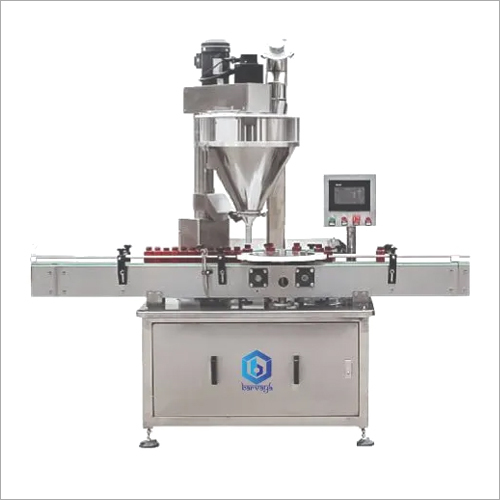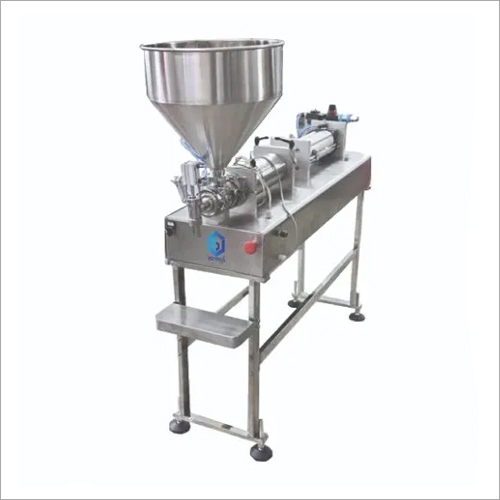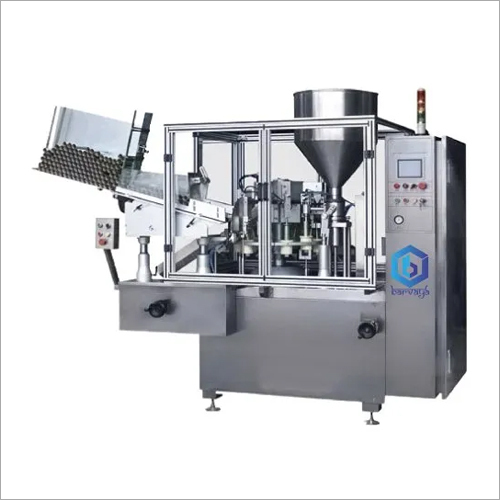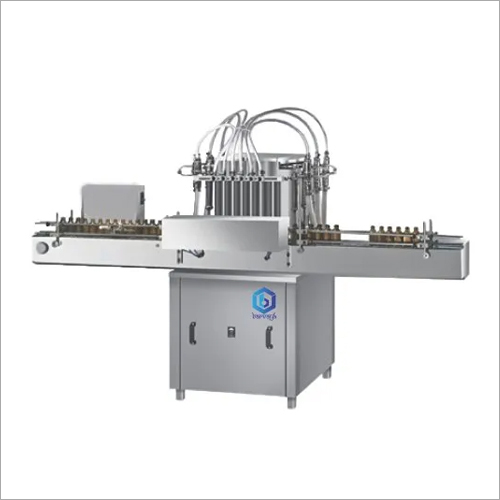Automatic Liquid Filling Machine
1200000 INR/Piece
Product Details:
- Material Stainless Steel
- Automatic Grade Automatic
- Control System PLC Control
- Drive Type Electric
- Voltage 415 Volt (v)
- Click to View more
X
Automatic Liquid Filling Machine Price And Quantity
- 1200000 INR/Piece
- 1 Piece
Automatic Liquid Filling Machine Product Specifications
- Stainless Steel
- 415 Volt (v)
- PLC Control
- Electric
- Automatic
Automatic Liquid Filling Machine Trade Information
- Cash in Advance (CID)
- 10 Piece Per Month
- 8-10 Week
- Australia, South America, Eastern Europe, Western Europe, Middle East, Africa, Central America, Asia, North America
- All India
Product Description
Available with pre programming arrangement, offered automatic electronic liquid filling machine is utilized for precise filling of fluid into containers without any wastage. This machine is equipped with advanced sensor and pressure transducer to maintain high filling precision. Its volumetric flow meter technology enables it to measure correct flow of filled fluid. This PLC controlled machine consumes 415 v voltage to function.
Advantages of Automatic Electronic Liquid Filling Machine:
1. Efficiency and Speed: Automatic electronic liquid filling machines are designed to operate at high speeds, significantly increasing the efficiency of the filling process. They can fill a large number of containers in a short period of time, reducing production time and increasing overall output.
2. Accuracy and Consistency: These machines are equipped with advanced electronic controls and sensors that ensure precise and consistent filling volumes. This eliminates human errors and variations in filling quantities, resulting in uniform product quality.
3. Reduced Labor Costs: By automating the filling process, businesses can reduce their reliance on manual labor for repetitive tasks. This can lead to significant cost savings in terms of labor expenses, as well as minimizing the need for rework due to human errors.
4. Minimized Product Loss: Automatic filling machines are designed to minimize product wastage. The precise measurements and controlled filling process reduce spillage and overfilling, which in turn reduces product loss and contributes to cost savings.
5. Versatility: These machines can handle a wide range of liquid viscosities and container sizes, making them versatile for different types of liquids and packaging requirements.
6. Hygiene and Safety: Automatic filling machines are built to meet high hygiene and safety standards. They are often constructed using materials that are compatible with various liquids and are easy to clean, ensuring the integrity of the products and the safety of consumers.
7. Flexibility: Many modern electronic filling machines come with programmable settings, allowing businesses to quickly switch between different product types and fill volumes. This flexibility is crucial for companies that produce multiple products on the same machine.
8. Data Monitoring and Reporting: These machines often come with electronic monitoring and reporting features. This allows businesses to track and analyze filling performance, identify any deviations, and make necessary adjustments to maintain product quality and efficiency.
9. Integration with Production Lines: Automatic electronic liquid filling machines can be seamlessly integrated into existing production lines, streamlining the entire manufacturing process. This integration can lead to improved overall production efficiency and throughput.
10. Compliance with Regulations: Many industries, such as pharmaceuticals and food and beverage, have strict regulations regarding accurate filling and labeling of products. Automatic filling machines can help businesses comply with these regulations by providing consistent and accurate filling results.
11. Reduced Operator Fatigue: Manual filling can be physically demanding and monotonous for operators, leading to fatigue and potential errors. Automatic filling machines alleviate this issue by taking over the repetitive tasks, allowing operators to focus on more value-added tasks.
12. Scalability: As businesses grow, their production demands increase. Automatic filling machines can be scaled up to meet higher production volumes without significant changes to the manufacturing process.
Applications of Automatic Electronic Liquid Filling Machine:
1. Food and Beverage Industry: Automatic filling machines are widely used for filling beverages such as juices, soft drinks, water, sauces, cooking oils, and dairy products into bottles, cans, and containers. They ensure accurate portion control and minimize the risk of contamination.
2. Pharmaceutical Industry: In the pharmaceutical sector, precise dosing is critical to ensure the safety and efficacy of medications. Automatic filling machines are used to fill liquid medicines, syrups, and medical liquids into vials, bottles, and other pharmaceutical containers.
3. Cosmetics and Personal Care: Products like shampoos, conditioners, lotions, creams, perfumes, and other cosmetic liquids require accurate filling to maintain product quality and packaging consistency. Automatic filling machines are used to meet these requirements efficiently.
4. Chemical and Industrial Products: Industrial liquids, such as chemicals, solvents, lubricants, and cleaning agents, often need precise filling for safety, regulatory compliance, and cost efficiency. Automatic filling machines are used to handle these potentially hazardous liquids.
5. Household and Cleaning Products: Liquid cleaning products, detergents, and disinfectants need accurate filling to ensure consumer safety and proper product functionality. Automatic filling machines can efficiently handle these products in various container types.
6. Automotive Industry: Lubricants, coolants, and other automotive fluids require precise filling to maintain vehicle performance. Automatic filling machines are used to fill these liquids into containers of different sizes.
7. E-Liquids: The industry relies on accurate and consistent filling of e-liquids into cartridges or bottles. Automatic filling machines ensure proper dosing and packaging for these products.
8. Brewing and Distilling: In the brewing and distilling industries, automatic filling machines are used to fill spirits, and other alcoholic beverages into bottles or cans. This maintains product quality and consistency.
9. Agriculture and Horticulture: Agricultural products such as fertilizers, pesticides, and plant nutrients require precise dosing to avoid over-application and ensure crop safety. Automatic filling machines help achieve accurate measurements.
10. Healthcare and Laboratories: Laboratories and healthcare facilities often use automatic filling machines for filling reagents, test liquids, and various medical solutions into vials, tubes, and other containers.
11. Petroleum Industry: Petroleum-based products like motor oils, lubricants, and fuel additives require accurate filling to ensure optimal performance. Automatic filling machines are employed to achieve consistent results.
12. Beverage Industry: Beyond soft drinks and juices, automatic filling machines are used to fill other beverages like energy drinks, flavored water, and sports drinks into bottles and cans.
13. Household Products: Products such as liquid soaps, detergents, and cleaning agents are efficiently filled using automatic filling machines to maintain uniform product quality and packaging.
14. Adhesives and Sealants: Precise dosing of adhesives, sealants, and bonding agents is crucial for their performance. Automatic filling machines handle these materials with accuracy.
15. Paint and Coatings Industry: Paints, varnishes, and coatings need accurate filling to achieve consistent color and coverage. Automatic filling machines ensure uniform distribution.
FAQ:
Q. What is an automatic electronic liquid filling machine?
Ans: An automatic electronic liquid filling machine is a mechanical device equipped with electronic controls and sensors that automates the process of accurately filling liquid products into containers, such as bottles, jars, cans, and vials.
Q. How does an automatic electronic filling machine work?
Ans: These machines use electronic controls to control the filling process. The liquid is pumped from a reservoir through a series of valves and nozzles into the containers. Sensors and controls ensure accurate volume measurement and controlled filling rates.
Q. What are the advantages of using automatic electronic filling machines?
Ans: Advantages include increased efficiency, precise and consistent filling, reduced labor costs, minimized product loss, improved hygiene, versatility, data monitoring, compliance with regulations, and more.
Q. What types of liquids can be filled using these machines?
Ans: These machines can handle a wide range of liquids, including beverages, pharmaceuticals, cosmetics, chemicals, cleaning agents, automotive fluids, and more, depending on the compatibility of the liquid with the machine's materials.
Q. What container types can be filled using these machines?
Ans: Automatic electronic filling machines can be configured to fill various container types, such as bottles, cans, jars, vials, pouches, and even customized packaging, depending on the machine's design and capabilities.
Q. Can these machines handle different fill volumes?
Ans: Yes, many machines are designed to handle different fill volumes. They can be programmed to adjust fill levels based on the specific requirements of the product and packaging.
Q. Are these machines easy to clean and maintain?
Ans: Modern machines are often designed for easy cleaning and maintenance. They may feature removable parts for cleaning and materials that are resistant to corrosion and damage from the liquids being filled.
Q. What safety features do these machines have?
Ans: Safety features can include interlocks, emergency stop buttons, guarding, and safety sensors to prevent accidents and ensure operator safety during operation.
Q. Can these machines be integrated into existing production lines?
Ans: Yes, many automatic filling machines are designed for easy integration into existing production lines, allowing for seamless incorporation into the manufacturing process.
Q. How accurate are these machines in terms of filling volumes?
Ans: Automatic electronic filling machines are known for their high accuracy, often achieving precise fill volumes within a very small margin of error.
Q. What are some considerations before purchasing an automatic electronic filling machine?
Ans: Consider factors like the types of liquids you'll be filling, the range of container sizes, required fill volumes, production speed, compatibility with your production line, maintenance requirements, and budget.
Q. Are there different types of filling mechanisms for these machines?
Ans: Yes, there are various filling mechanisms, such as piston fillers, gravity fillers, pressure fillers, and more. The choice depends on the characteristics of the liquid and the required accuracy.
Q. Can these machines handle products with particulates or solids?
Ans: Some machines can handle liquids with small particulates or solids, depending on the specific design and features of the machine.
Q. Do these machines require specialized training to operate?
Ans: While basic training is typically required, modern machines often come with user-friendly interfaces and controls that make operation relatively straightforward.
Q. What is the cost range for automatic electronic liquid filling machines?
Ans: Costs vary widely based on factors like the machine's capacity, features, complexity, and brand. It's important to consider long-term benefits and return on investment when evaluating costs.
Tell us about your requirement

Price:
Quantity
Select Unit
- 50
- 100
- 200
- 250
- 500
- 1000+
Additional detail
Mobile number
Email

 English
English Spanish
Spanish French
French German
German Italian
Italian Chinese (Simplified)
Chinese (Simplified) Japanese
Japanese Korean
Korean Arabic
Arabic Portuguese
Portuguese







